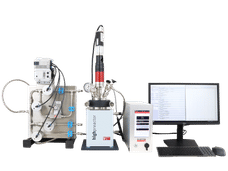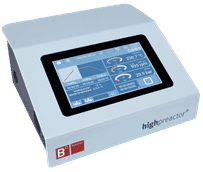Engineering algae to make fuel instead of sugar
Optics Express research describes how tiny organism can make biofuel
Advertisement
In pursuing cleaner energy there is such a thing as being too green. Unicellular microalgae, for instance, can be considered too green. In a paper in a special energy issue of optics Express, the Optical Society's (OSA) open-access journal, scientists at the University of California, Berkeley describe a method for using microalgae for making biofuel. The researchers explain a way to genetically modify the tiny organisms, so as to minimize the number of chlorophyll molecules needed to harvest light without compromising the photosynthesis process in the cells. With this modification, instead of making more sugar molecules, the microalgae could be producing hydrogen or hydrocarbons.
Berkeley researchers have identified the genetic instructions in the algae genome responsible for deploying approximately 600 chlorophyll molecules in the cell's light-gathering antennae. They believe that the algae can get along with as few as 130 molecules. Basically the scientists want to divert the normal function of photosynthesis from generating biomass to making products such as lipids, hydrocarbons, and hydrogen.
Tasios Melis, one of the paper's co-authors, argues that the algae's chlorophyll antennae help the organisms compete for sunlight absorption and survive in the wild, where sunlight is often limited, but is detrimental to the engineering-driven effort of using algae to convert sunlight into biofuel.
Melis uses the phrase "cellular optics" to describe this general effort to maximize the efficiency of the solar-to-product conversion process. Besides getting the algae to convert more sunlight to fuel, another issue that needs to be addressed is how to configure bio-culture tanks in such a way that sunlight can penetrate the outer layer of algae so that lower-down layers can participate in the photo-conversion too.
Microalgae are ideal because of their high rate of photosynthesis; they are perhaps ten times more efficient in this than the land plants—such as sugarcane, corn, and switchgrass—often discussed as possible biofuel stocks.
How soon can algae play a role? According to Melis, "Progress is substantial to date, but not enough to make the process commercially competitive with fossil fuels. Further improvement in the performance of photosynthesis under mass culture conditions, and in the yield of "biofuels" by the microalgae are needed before a cost parity with traditional fuels can be achieved."
Original publication: Mautusi Mitra and Anastasios Melis; "Optical properties of microalgae for enhanced biofuels production,"; Optics Express, Vol. 16, Issue 6, December 22, 2008, Focus Issue on Solar Energy edited by Alan Kost, University of Arizona.
Other news from the department science
These products might interest you
Most read news
More news from our other portals
See the theme worlds for related content
Topic world Synthesis
Chemical synthesis is at the heart of modern chemistry and enables the targeted production of molecules with specific properties. By combining starting materials in defined reaction conditions, chemists can create a wide range of compounds, from simple molecules to complex active ingredients.

Topic world Synthesis
Chemical synthesis is at the heart of modern chemistry and enables the targeted production of molecules with specific properties. By combining starting materials in defined reaction conditions, chemists can create a wide range of compounds, from simple molecules to complex active ingredients.

























































